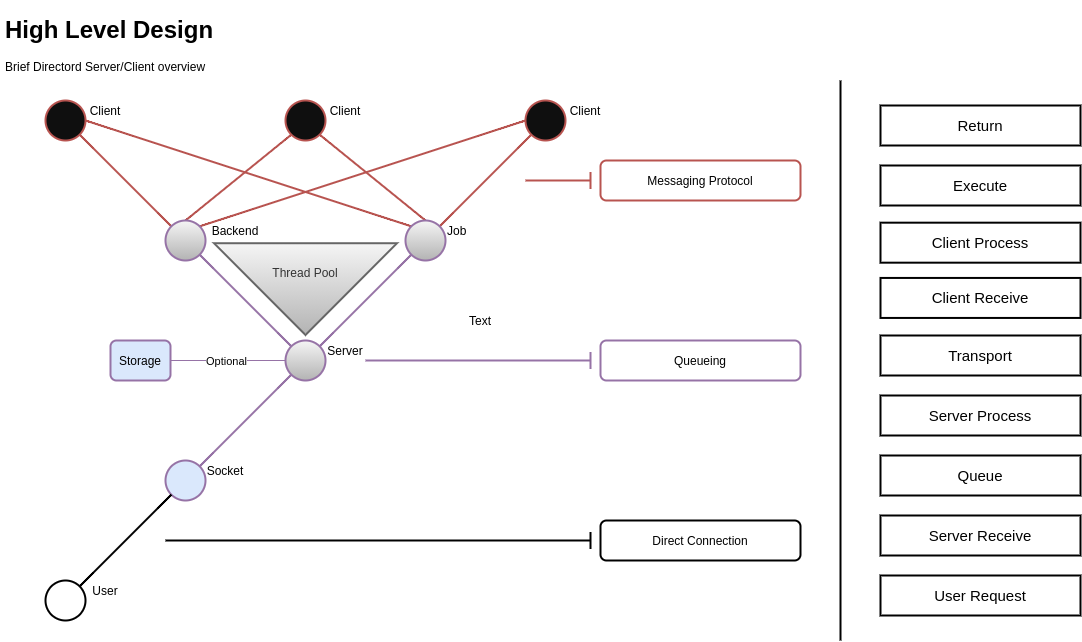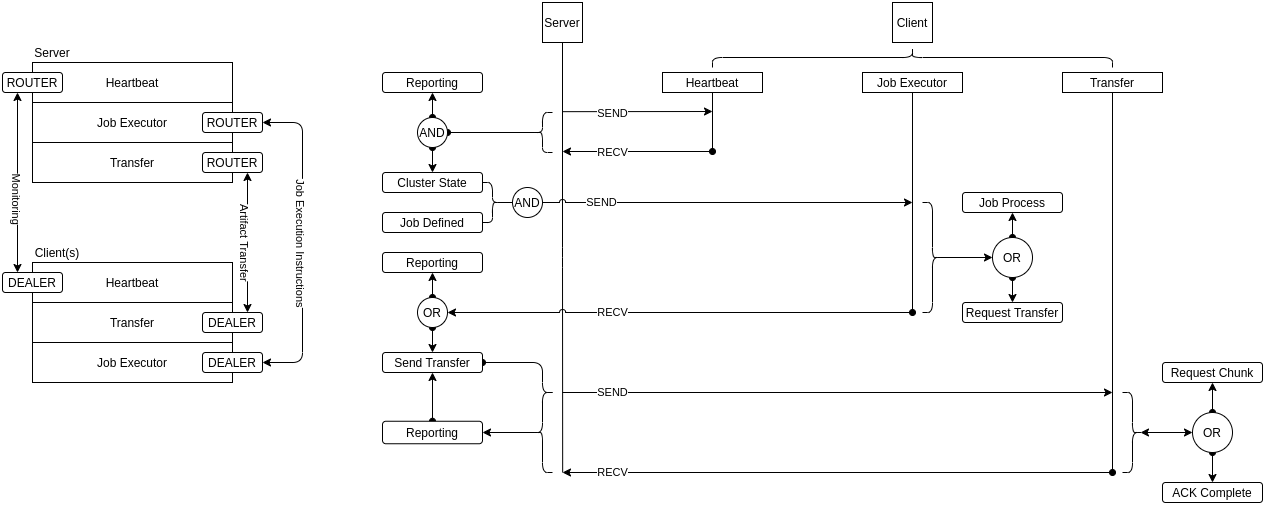Directord
An asynchronous deployment and operations platform with the aim to better enable simplicity, faster time to delivery, and consistency.
This project is maintained by oshied
Directord Components
Directord is a single application which consists of three parts:
-
Server - The server is the centralized manager of all communication and application delivery.
-
Client - The client is the minimal application required for enrolling a node into a given cluster.
-
User - CLI utility which interfaces with the server over a local socket connect.

Cluster Messaging
The cluster messaging uses a router format which ensures it has bi-directional communication to and from the nodes. The router allows us to create a low latency mesh which monitors node health and ensures is highly responsive instruction delivery network.

The application flow has been built to best enable asynchronous operations, easily scaling to hundreds of clients without impacting throughput. While the User is expected to interact with the system via CLI, Directord does provide bindings for programable interfaces.
Management
The User CLI provides for cluster management and insight into operations. These functions allow operators to see and manipulate job and node status within the cluster.
Data storage and persistance
Directord has two modes of operation for data-storage and persistence.
- Ephemeral mode, only retain cluster and job information so long as the server process is running.
If the datastore option is set to memory, the server will spawn a manager thread to facilitate the document store.
- Persistent mode, datastore using external datastore; supported datastores are: Redis and File. The datastore option available in both config, or on the CLI and uses a standard RFC-1738 compatible string. This allows operators to connect to different storage backends to suit their environment needs.
Storing information persistently introduces a dependency on an external system and creates latency. While the latency should be minimal, and have nearly no impact on task execution, it is something that needs to be considered when constructing the cluster topology. Inversely, using an external datastore will lower the memory utilization of Directord and can have a profound effect on deployment node requirements; this is especially true at hyper-scale.
The
datastoreoption has three potential drivers, memory, file, or redis.
| Datastore | Configuration (/etc/directord/config.yaml) |
|---|---|
| disc | file:///var/cache/directord |
| redis | redis://127.0.0.1:6379/4 |
| memory (default) | memory |
Client caching and persistence
Directord clients make use of a POSIX friendly cache, which allows the server and client interactions make use of stored values and ensure client level idempotency during execution. Cached task values are stored for 72 hours unless otherwise configured differently. Cached ARGS are stored indefinitely but can be EVICTED through client interactions as needed.
Profiling
Every Directord task is profiled. The execution and the round trip time are stored and made available when inspecting jobs. This builtin profiling allows operators to better understand their deployment workloads.
-
ROUNDTRIP_TIME: Time taken from task transmit to return. The server will timestamp every task when spawned, and will store the delta when the return data is received by the server.
-
EXECUTION_TIME: Time taken to run a particular task. The client will timestamp every task before execution and return the delta once the task exits.
To further understand deployment characteristics, Directord also provides an analyze function which will allow operators to dig deeper into their data. The job and parent analyze functions will highlight outliers, node discrepancies, failures, and performance for entire orchestrations.
$ sudo /opt/directord/bin/directord orchestrate ~/directord/tests/comparison-orchestration.yaml --target directord-{0..5} --wait
# Note the ID used in this command is the "Parent" UUID for a given orchestration
$ sudo /opt/directord/bin/directord manage --analyze-parent fd9c7387-de10-420f-92fe-2ac0a4716c8d
KEY VALUE
------------------------ ------------------------------------
ID fd9c7387-de10-420f-92fe-2ac0a4716c8d
ACTUAL_RUNTIME 18.774806261062622
COMBINED_EXECUTION_TIME 61.2486093044281
FASTEST_NODE_EXECUTION directord-2
FASTEST_NODE_ROUNDTRIP directord-2
SLOWEST_NODE_EXECUTION directord-0
SLOWEST_NODE_ROUNDTRIP directord-0
TOTAL_AVG_EXECUTION_TIME 0.0612486093044281
TOTAL_FAILURES 0
TOTAL_JOBS 1000
TOTAL_NODE_COUNT 6
TOTAL_SUCCESSES 6000
Total Items: 12